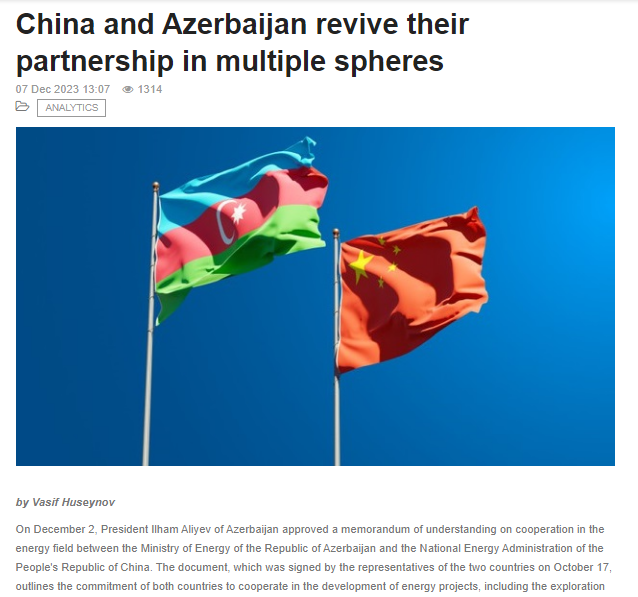On December 2, President Ilham Aliyev of Azerbaijan approved a memorandum of understanding on cooperation in the energy field between the Ministry of Energy of the Republic of Azerbaijan and the National Energy Administration of the People's Republic of China. The document, which was signed by the representatives of the two countries on October 17, outlines the commitment of both countries to cooperate in the development of energy projects, including the exploration and development of offshore wind energy resources. This agreement is expected to help promote the use of renewable energy sources in Azerbaijan, as well as support the participation of the private sector in this area to improve financial sustainability and efficiency of the energy sector.
This comes amidst the renewed efforts by the two countries to deepen their cooperation in various spheres of mutual interest, particularly in connectivity, energy, and trade. The trade volume between the two nations skyrocketed by more than 21 percent last year, reaching approximately 2.2 billion US dollars. Notably, Azerbaijan has solidified its position as China's largest trade partner in the South Caucasus, a testament to the robust economic collaboration.
According to Azerbaijan’s ambassador to China, the energy sector is a top priority in the bilateral relations. China’s advanced expertise in alternative energy is a factor that aligns seamlessly with Azerbaijan’s ambitions to diversify its economy and reduce dependency on hydrocarbon resources. In the course of the visit of Azerbaijan’s energy minister to China, within the framework of the Belt and Road International Cooperation Forum on October 17, negotiations were held concerning the participation of Dongfang in the construction of Garadagh SPP with a capacity of 230 MW, cooperation with China Gezhouba Group Overseas Investment on renewable energy projects with a capacity of 2 GW in Azerbaijan.
The aforementioned memorandum of understanding, which was signed during this visit, paves the way for expanded cooperation in electricity, oil and gas, petrochemicals, and renewable energy. It encompasses the introduction of new technologies, infrastructure renewal, mutual investment promotion, and knowledge exchange through conferences and forums.
The two countries share interest also in the realm of connectivity where Azerbaijan has strategically positioned itself as a key player in the transportation between Europe and Asia via the Trans-Caspian International Transport Route, also known as the Middle Corridor. The Baku International Sea Trade Port, the Baku-Tbilisi-Kars railway line, and other infrastructural projects form a comprehensive network that offers efficient routes for transporting goods between the two edges of Eurasia. The Middle Corridor is gaining traction, attracting interest from Chinese transit operators and logistics companies. Cooperation in block trains, logistics information exchange, and cargo placement underscores the commitment to optimizing transportation routes.
The resumption of cargo transportation by trains from China to Azerbaijan in early December marks a historic moment. The first cargo, comprising 110 TEU of electric cargo, construction materials, and industrial products, arrived in Baku port, symbolizing the tangible results of collaborative efforts. The strategic positioning of the South Caucasus, including Azerbaijan, is gaining prominence in the broader context of the EU–China transportation route, particularly against the backdrop of the disruptions on the trans-Russia passage. The European Union's new strategy on connecting Europe and Asia aligns with the regional countries' goal of becoming a connectivity hub between the two continents.
That said, the burgeoning China-Azerbaijan partnership encapsulates a compelling narrative of collaboration, mutual benefit, and shared aspirations. From robust trade relations to groundbreaking energy projects and strategic connectivity initiatives, the two nations are shaping a resilient alliance that extends beyond economic realms. As the Silk Road echoes in contemporary endeavors, and the South Caucasus eyes its role as a pivotal hub, the China-Azerbaijan partnership exemplifies a dynamic synergy that holds significant promise for the future.
https://news.az/news/china-and-azerbaijan-revive-their-partnership-in-multiple-spheres








